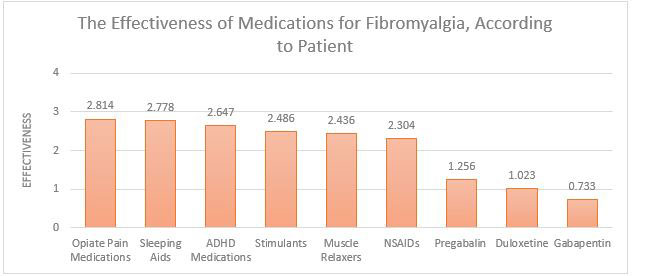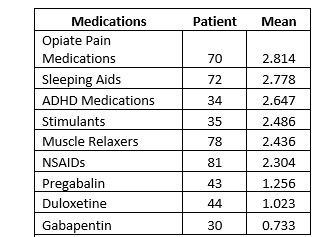Session Information
Session Type: Poster Session (Sunday)
Session Time: 9:00AM-11:00AM
Background/Purpose: To assess patients’ global assessment of frequently used treatments for the fibromyalgia syndrome (FMS), we asked patients with fibromyalgia to rank medications they have tried for their effectiveness.
Methods: 95 patients (mean age of 50.5) diagnosed with fibromyalgia based on the 2011 ACR criteria, 88 females and 7 males, completed an in-office questionnaire regarding the effectiveness of various medications often used to treat fibromyalgia. The study ranked 9 medications, which include Pregablin, Gabapentin, Duloxetine, Muscle Relaxants, Sleep Aids, Stimulants, ADHD Medications, Opiate Pain Medications, and NSAIDS. Patients rated the medications using this scale: 1=minimally helpful, 2=somewhat helpful, 3=moderately helpful, 4=very helpful.
Results: The three medications that were most positively rated by patients were opiate pain meds (mean=2.8), medications to improve sleep (mean= 2.8), and ADHD stimulants for fibro fog symptoms (mean=2.6).
The medications with the lowest effectiveness ratings by fibromyalgia patients included: gabapentin (mean=0.73); duloxetine (mean=1.02); pregabalin (mean=1.26). 59.1% of FMS patients reported little or no help from pregabalin, and 83.3 % found gabapentin to be little help.
Conclusion: Fibromyalgia patients rated the effectiveness of various medications that they tried. Pain medication, sleep aids and stimulants given for the attention deficit component of fibro fog were judged by patients to be the most helpful.
To cite this abstract in AMA style:
Katz R, Polyak Wokurka J, Small B. The Effectiveness of Medications for Fibromyalgia Based on Patient Experiences [abstract]. Arthritis Rheumatol. 2019; 71 (suppl 10). https://acrabstracts.org/abstract/the-effectiveness-of-medications-for-fibromyalgia-based-on-patient-experiences-4/. Accessed .« Back to 2019 ACR/ARP Annual Meeting
ACR Meeting Abstracts - https://acrabstracts.org/abstract/the-effectiveness-of-medications-for-fibromyalgia-based-on-patient-experiences-4/


